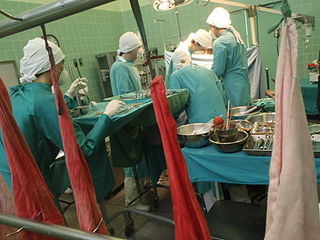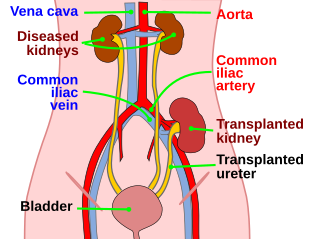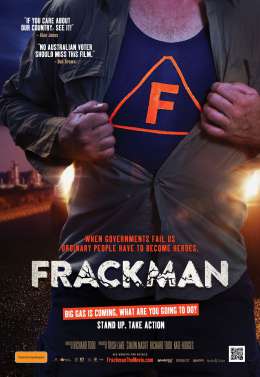
Organ donation is the process when a person allows an organ of their own to be removed and transplanted to another person, legally, either by consent while the donor is alive or dead with the assent of the next of kin.

Organ transplantation is a medical procedure in which an organ is removed from one body and placed in the body of a recipient, to replace a damaged or missing organ. The donor and recipient may be at the same location, or organs may be transported from a donor site to another location. Organs and/or tissues that are transplanted within the same person's body are called autografts. Transplants that are recently performed between two subjects of the same species are called allografts. Allografts can either be from a living or cadaveric source.

David Leslie Koch, nicknamed "Kochie", is an Australian television presenter who is best known as a host of the Seven Network's breakfast program, Sunrise. From Adelaide, he began his media career as a financial journalist, writing for a number of different publications before eventually moving to television. Koch has been the chairman of the Port Adelaide Football Club, an Australian Football League (AFL) club, since October 2012.

Xenotransplantation, or heterologous transplant, is the transplantation of living cells, tissues or organs from one species to another. Such cells, tissues or organs are called xenografts or xenotransplants. It is contrasted with allotransplantation, syngeneic transplantation or isotransplantation and autotransplantation. Xenotransplantation is an artificial method of creating an animal-human chimera, that is, a human with a subset of animal cells. In contrast, an individual where each cell contains genetic material from a human and an animal is called a human–animal hybrid.

A face transplant is a medical procedure to replace all or part of a person's face using tissue from a donor. Part of a field called "Vascularized Composite Tissue Allotransplantation" (VCA) it involves the transplantation of facial skin, the nasal structure, the nose, the lips, the muscles of facial movement used for expression, the nerves that provide sensation, and, potentially, the bones that support the face. The recipient of a face transplant will take life-long medications to suppress the immune system and fight off rejection.

Kidney transplant or renal transplant is the organ transplant of a kidney into a patient with end-stage kidney disease (ESRD). Kidney transplant is typically classified as deceased-donor or living-donor transplantation depending on the source of the donor organ. Living-donor kidney transplants are further characterized as genetically related (living-related) or non-related (living-unrelated) transplants, depending on whether a biological relationship exists between the donor and recipient.
The following lists events that happened during 1900 in Australia.

The United Network for Organ Sharing (UNOS) is a non-profit, scientific and educational organization that administers the only Organ Procurement and Transplantation Network (OPTN) in the United States, established by the U.S. Congress in 1984 by Gene A. Pierce, founder of United Network for Organ Sharing. Located in Richmond, Virginia, the organization's headquarters are situated near the intersection of Interstate 95 and Interstate 64 in the Virginia BioTechnology Research Park.
Organ procurement is a surgical procedure that removes organs or tissues for reuse, typically for organ transplantation.
Organ trade is the trading of human organs, tissues, or other body products, usually for transplantation. According to the World Health Organization (WHO), organ trade is a commercial transplantation where there is a profit, or transplantations that occur outside of national medical systems. There is a global need or demand for healthy body parts for transplantation, which exceeds the numbers available.
Several authors have used the terms organ gifting and "tissue gifting" to describe processes behind organ and tissue transfers that are not captured by more traditional terms such as donation and transplantation. The concept of "gift of life" in the U.S. refers to the fact that "transplantable organs must be given willingly, unselfishly, and anonymously, and any money that is exchanged is to be perceived as solely for operational costs, but never for the organs themselves". "Organ gifting" is proposed to contrast with organ commodification. The maintenance of a spirit of altruism in this context has been interpreted by some as a mechanism through which the economic relations behind organ/tissue production, distribution, and consumption can be disguised. Organ/tissue gifting differs from commodification in the sense that anonymity and social trust are emphasized to reduce the offer and request of monetary compensation. It is reasoned that the implementation of the gift-giving analogy to organ transactions shows greater respect for the diseased body, honors the donor, and transforms the transaction into a morally acceptable and desirable act that is borne out of voluntarism and altruism.

A heart transplant, or a cardiac transplant, is a surgical transplant procedure performed on patients with end-stage heart failure or severe coronary artery disease when other medical or surgical treatments have failed. As of 2018, the most common procedure is to take a functioning heart, with or without both lungs, from a recently deceased organ donor and implant it into the patient. The patient's own heart is either removed and replaced with the donor heart or, much less commonly, the recipient's diseased heart is left in place to support the donor heart.
The Bravery Council of Australia Meeting 77 Honours List was announced by the Governor General of Australia on 27 August 2012.

Frackman is a 2015 Australian documentary film about the former construction worker turned anti-fracking activist Dayne Pratzky as he responds to the expansion of the coal seam gas industry near Tara, Queensland. The film was produced by Simon Nasht of Smith & Nasht in collaboration with Trish Lake of Freshwater Pictures and was co-directed by Richard Todd of Aquarius Productions with Jonathan Stack. The film also features the president of Lock the Gate, Drew Hutton, conservative radio personality Alan Jones and many other residents of Queensland and New South Wales.
Organ donation is when a person gives their organs after they die to someone in need of new organs. Transplantation is the process of transplanting the organs donated into another person. This process extends the life expectancy of a person suffering from organ failure. The number of patients requiring organ transplants outweighs the number of donor organs available.
Cameron Beck Allan was an Australian-born American-based composer, record producer, filmmaker and former label owner. In September 1978 he co-founded the record label Regular Records with fellow filmmaker Martin Fabinyi. Their first signing was the new wave group Mental As Anything, and their second was the pub rock band Flowers. Allan produced both groups' early work. His TV and film music compositions include Stir (1980), The Umbrella WomanKojak: Ariana (1989), and Kojak: Flowers for Matty (1990). In 1986 he relocated to the United States and in July 1992 he married Margaret Wertheim, a science writer. The couple had separated by 2007. Cameron Allan died of liver failure, after a transplant, aged 57.
Ben McNeill is an Australian film producer of feature and documentary films, including the 2018 organ transplant feature documentary Dying to Live (2018), which follows those awaiting an organ on the organ transplant list, and which was shortlisted for a 2018 AACTA Award.

Ian David Darling is a documentary film director and producer.
Organ donation in India is regulated by the Transplantation of Human Organs and Tissues Act, 1994. The law allows both deceased and living donors to donate their organs. It also identifies brain death as a form of death. The National Organ and Tissue Transplant Organisation (NOTTO) functions as the apex body for activities of relating to procurement, allotment and distribution of organs in the country.

Aquarius Films is an independent Australian film and TV production company based in Sydney, founded in 2008 by producers Angie Fielder and Polly Staniford. TV credits include Love Me, The Unusual Suspects, The Other Guy and Savage River Film credits include Academy Award and Golden Globe nominated Lion starring Dev Patel and Nicole Kidman, produced by Aquarius in association with See-Saw Films and the psychological thriller Berlin Syndrome starring Teresa Palmer and Directed by Cate Shortland which premiered at Sundance Film Festival, Dirt Music, directed by Gregor Jordan and starring Garrett Hedlund, Kelly Macdonald and David Wenham and Wish You Were Here, starring Joel Edgerton and Teresa Palmer, which premiered at Sundance Film Festival and won two Australian Academy of Cinema and Television Arts (AACTA) Awards, including Best Screenplay, and five Film Critics Circle Awards, including Best Film.











